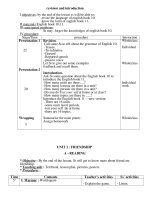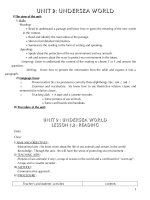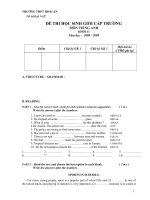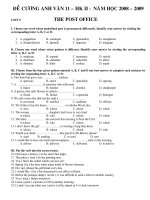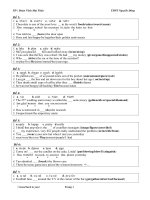anh van 11
Bạn đang xem bản rút gọn của tài liệu. Xem và tải ngay bản đầy đủ của tài liệu tại đây (105.06 KB, 4 trang )
<span class='text_page_counter'>(1)</span><div class='page_container' data-page=1>
<i><b>UNIT 1: FRIENDSHIP </b></i>
* VOCABULARY:
1. quality (n)
2. troubled ['trʌbld]: băn khoăn, lo lắng, bồn chồn.
3. to brighten up /'braitn ʌp/ : làm sáng lên, làm rạng rỡ, làm sung sướng.
4. acquaintance /a'kweintans/ (n.): người quen, sự quen biết.
5. intimate /'intimat/(adj.) : thân mật, mật thiết, thân tình.
6. common / 'kɔmən/(adj): chung, cơng, cơng cộng.
7. capable /'keipabl/ (adj.): có tài, có năng lực, giỏi,có thể, có khả năng,
# incapable /in'keipabl/ : không đủ khả năng, bất tài, bất lực.
(+of) khong the
8. lasting /'la:stirj/(adj.) : trường tồn.
10. self /self/ (n.): bản thân mình, cái tôi.
Family words
a. selfish (adj.) ['selfi∫]: ích kỉ
b. selfishness (n) ['selfi∫nis]: sự ích kỉ, tính ích kỉ.
c. unselfishness (n) [,ʌn'selfi∫nis]:tính khơng ích ky.
11. concerned with /kan's3:nd/(v.t.) : liên quan đến, dính líu đến.
12. two-sided /'saidid/ : hai bên, hai cạnh.
13. affair [ə'feə] (n.): việc, công việc, việc làm, sự việc.
14. give-and-take (n): mối quan hệ cho và nhận.
1 5. constancy /'konstansi/(n.) : sự bền lịng, tính kiên trì, tính kiên định
16. to take up (an interest) : bắt đầu ( một sở thích).
17. enthusiasm /in'θju:ziỉzm/: sự hăng hái, sự nhiệt tình.
1 8. to change /tjeind3/(v.t.): đổi, thay đổi.
Family words:
a. changeable (adj.) ['t∫eindʒəbl] : dễ thay đổi, hay thay đổi
b. changed (adj.) # unchanged (adj.): thay đổi # không thay đổi.
19. certain/'s3:tn/ (adj.) # uncertain (adj.) chắc chắn , nào đó # khơng chắc chắn.
<b>Family words:</b>
certainty (n) ['sə:tnti] điều chắc chắn # uncertainty (n.) [ʌn'sə:tnti] : điều không chắc chắn.
20. lifelong /'laiflɔη/ (adj.) : suốt đời.
21. loyalty /'lɔiəlti/ (n): lòng trung thành, lòng trung nghĩa, lòng trung kiên.
<b>Family word</b>
loyal /'lɔiəlti/ adj.): trung thành, trung nghĩa.
22. suspicious [sə'spi∫əs](adj.): (+about/of) có sự nghi ngờ, tỏ ra có sự nghi ngờ.
Family words:
suspicion /sə'spijn/(n.) (+about, that) : sự nghi ngờ, sự bị nghi ngờ
suspect /sa'spekt/ (n.): người khả nghi, người bị tình nghi.
23. to think much of sb = to like sb, to fancy sb
24. rumour /'ru:m3/(n.): tin đồn , lời đồn, tiếng đồn.
25. gossip /'gosip/(n.): chuyện tầm phào, tin đồn nhảm.
26. to influence /'influ3ns/(v.): ảnh hưởng, chi phối, tác động.
27. whisper /'wispə/: tiếng nói thầm, tiếng xì xào.
28. trust /trʌst/: sự tín nhiệm ,lòng tin, sự tin cậy.
29. mutual /'mju:t∫uəl/(adj.): lẫn nhau, qua lại.
30. secret /si:krit/(n.) : điều bí mật, bí quyết, điều bí ẩn.
31. talkative /'tɔ:kətiv/ (adj)thích nói, hay nói; lắm mồm; ba hoa; bép xép
32. sympathy /'simpəθi/(n) : sự thông cảm, sự đồng cảm, sự thương cảm.
<b>Family words</b>
to sympathize /'simpəθaiz/(v.i.): có thiện cảm, tỏ cảm tình ( với ai), thơng cảm.
sympathetic /,simpə'θetik/ (adj.) (+to/towards/with somebody): thông cảm.
33. joy /dʒɔi/ (n) : niềm vui = delight (n)
34. sorrow /'sɔrou/ (n.): (+at/for/over) sự đau khô, sự buồn phiền. = grief (n)
35. pursuit [pə'sju:t](n.): sự đuổi theo, sự đuổi bắt.
36. pleasure /'pleʒə/ (n.) = enjoyment : niềm vui thích, điều thích thú.
37. to exist /ig'zist/(v.i.) : tồn tại, sống , hiện có.
<b>Family words:</b>
</div>
<span class='text_page_counter'>(2)</span><div class='page_container' data-page=2>
38. possible /"posəbl/ (-adj.): có thể, có thể thực hiện được. # impossible/im'posəbl/ khơng có thể,
khơng có thể thực hiện được
<b>Family word:</b>
possibility /,pɔsə'biləti/(n): khả năng, sự kiện có thể xảy ra.# impossibility /im,posəbiliti/(n.): việc
khơng thể làm được, điều khơng thể có
39. to base on /beis/: dựa vào, căn cứ vào
<b>EXERCISES</b>
<b>A. PHONETIC</b>
<b> Choose the word whose underlined part is pronounced differently from that of the</b>
<b>other words.</b>
1) A. change B. children C. machine D. church
2) A. guitarist B. passenger C. generous D. village
3) A. other B. long C. possible D. constancy
<b>B. VOCABULARY AND GRAMMAR</b>
<b>I. Choose the best answer to complete each sentence.</b>
1) Most of the undeveloped countries need a lot of ... aid.
A. together B. unselfish C. mutual D. friend
2) He is too ... to lend me his bicycle.
A. selfish B. enthusiastic C. helpful D. pleasant
3) Suddenly she recognized the ... of the situation that made her laugh.
A. wonder B. pleasure C. understanding D. hunour
4) He is a ...person because he is always friendly with everyone.
A. helpful B. good-natured C. honest D. quick-witted
5) If you want to get a good result in every work, you should have a...
A. loyalty B. sympathy C. constancy D. unselfishness
6. I was...of his motives.
A. suspect B. suspicion C. suspicious D. suspiciously
7) . Can you ---your best friend’s physical characteristics?
A. describe B. say C. talk D. do
8) The children seem to be totally ... of working quietly by themselves.
A. unable B. impossible C. incapable D. not able
9 They let their children ... up late at weekends.
A. staying B. stay C. to stay D. stayed
10) The children were eager ... their parents.
A. to see B. see C. seeing D. saw
11) I’d rather ... at home.
A. to stay B. staying C. stayed D. stay
12) Peter is very funny. He makes me ... a lot
A. laugh B. to laugh C. laughing D. laughed
19) They noticed him ... the agreement.
A. sign B. to sign C. signing D. signed
13) It’s important for her ... the office.
A. ringing B. ring C. rang D. to ring
14) They would ... go by plane than spend a week traveling by train.
A. like B. rather C. prefer D. better
15) The boss made ... for a meeting after work.
A. us to stay B. us stay C. us staying D. us to staying
<b>II. Choose the underlined part among A, B, C or D that needs correcting.</b>
</div>
<span class='text_page_counter'>(3)</span><div class='page_container' data-page=3>
17) There are a lot of work to do here.
A B C D
18) I’m sure he is incapable in running a mile in four minutes.
A B C D
19) Good friendship should be basing on mutual understanding.
A B C D
20) I’m delighted hearing that you have made much progress in your study.
A B C D
<b>III. Put the verbs in parentheses into the correct form.</b>
<b> 21) That was a very strange question (ask) ... .</b>
21) It was very kind of you (show)... the way.
23) The teacher let him (stay) ... at home to finish the assignment.
24) It was quite a surprise (see) ... him again.
25) I overheard him (say) ... that he didn’t want to learn Math.
26) She stood there and watched him (drive) ... away.
27) It was very difficult for her (drive)... the motorbike.
28) I could feel the robber (come) ... from the backdoor.
<b>C. READING</b>
<b>Read the passage and choose one correct answer for each question.</b>
MANDI’S MAKING FRIENDS
My name’s Mandi. Three months ago, I went to disco where I met a boy called Tom. I
guessed he was older than me, but I liked him and thought it didn’t matter. We danced a
couple of times, then we chatted. He said he was 18, then asked how old I was. I told him I
was 16. I thought that if I told him my real age, he wouldn’t want to know me, as I’m only
13.
After the disco we arranged to meet the following weekend. The next Saturday we went
for a burger and had a real laugh. Afterwards he walked me to my street and kissed me
goodnight. Things went really well. We see each other a couple of times a week, but I’ve
had to lie to my parents about where I’m going and who with. I’ve always got on with them,
but I know if they found out how Tom was they’d stop me seeing him.
Now I really don’t know what to do. I can’t go on lying to my parents every time I go
out, and Ton keeps asking he can’t come around to my house. I’m really worried and I need
some advice.
29) Why has Mandi written this?
A. to describe her boyfriend B. to prove how clever she is
C. to explain a problem D. to defend her actions
30) Who is she writing to?
A. her boyfriend B. her parents
C. a teenage magazine D. a school friend
31) Why is Mandi worried?
A. She’s been telling lies. B. Tom has been behaving strangely.
C. She’s not allowed to go to disco. D. Her parents are angry with her.
32) Why can’t Tom come to Mandi’s house?
A. She doesn’t want her parents to meet him.
B. Her parents don’t like him.
C. He’s nervous of meeting her parents.
</div>
<span class='text_page_counter'>(4)</span><div class='page_container' data-page=4>
B. You must start by being honest with everyone.
C. Everyone’s unfair to you.
D. Don’t worry. I’m sure Tom will change his mind.
<b>D. WRITING</b>
<b>Arrange these words or groups of words in the correct order.</b>
34) tell/ have/ news/ We/ to/ not/ do/ any/ you
...
35) to/ 8.00/ for/ It’s/ be/ before/ impossible/ me/ there
...
36) man/ through/ window/ 5/ I/ minutes/ jump/ the/ saw /a/ ago
...
37) me/ to/ with/ in/ They/ Florida/ invited/ stay/ them
...
38) hair/ friend/ My/ has/ face/ and/ black/ an/ oval
...
<b>Report these sentences using one of these verbs. Use each verb one only.</b>
<b>tell, let, invite, order, promise, refuse, </b>
41. You cant borrow the car!
He ...
40. His parents allowed him to go out last night
His parents...
41. I'll phone you soon.
He ...
42. My teacher made me this exercise at home
My teacher...
43. Would you like to go out for dinner?
He ...
</div>
<!--links-->
